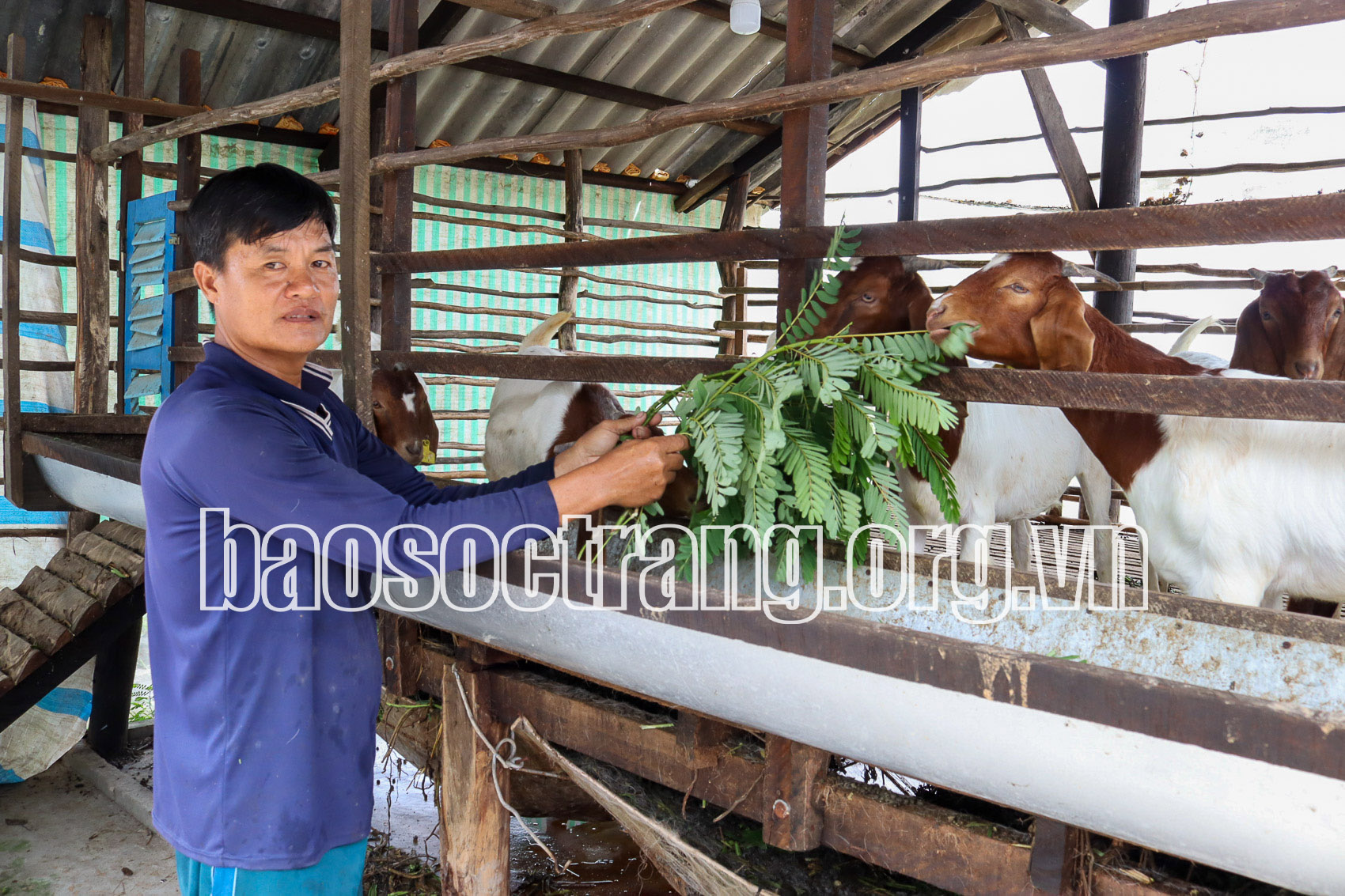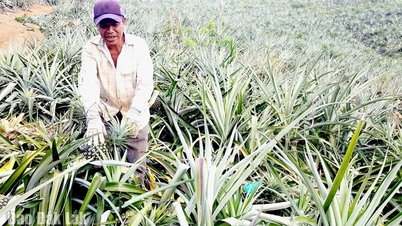STO - According to many farmers, raising goats requires less labor and lower feed costs compared to some other livestock. Goat feed is diverse and readily available in nature. The market for goat meat and breeding stock is quite good; the selling price ensures farmers make a profit after sale. Because of these characteristics, many farmers in various localities in Soc Trang province have developed goat farming models at the household level.
Mr. Tran Van Chia, from My Phuoc commune, My Tu district (Soc Trang province), who has been raising goats for many years, shared: "Up to now, I have been raising Australian Boer goats for 8 years, with a total of 40 goats, including 10 breeding goats, and the rest for breeding stock and meat. Before raising goats, my family raised pigs for meat but had to stop due to unforeseen circumstances. After researching, I found that goats are a type of livestock with low investment costs and easily adaptable to the natural conditions here, so I decided to maintain the herd until now."
According to Mr. Chia, with 10 breeding goats, they give birth to 3 litters every 2 years, yielding 180-190 kids. On average, Mr. Chia sells over 30 goats to the market each year, including 6-7 meat goats. Breeding goats are raised for 5-6 months from birth to sale, priced at 3-4 million VND per goat. Meat goats are raised for 7-12 months to reach the weight needed for sale to restaurants (28-70 kg per goat). On average, with 30 goats sold, after deducting all expenses, the profit is approximately 70 million VND per year. Mr. Chia plans to increase his breeding herd to 20 goats to provide even more breeding and meat goats to the market.
“To ensure a fresh food supply for the goats every day, I dedicated two acres of rice paddy land to growing grass for them to eat. Besides grass, I also supplement their diet with various leaves found in nature or vegetables and fruits if available. For breeding goats, I provide additional animal feed to increase their nutritional intake. The goat pens are well-ventilated. Breeding goats are kept separately for easy observation and care of their offspring. During pregnancy, both the mother and the unborn kids need nutritional injections. Three days after birth, the kids should receive an iron injection. Adult breeding and meat goats are vaccinated against diseases such as hemorrhagic septicemia and parasitic infections,” Mr. Tran Van Chia added.
Mr. Tran Van Chia, from My Phuoc commune, My Tu district (Soc Trang province), stands beside his family's breeding goat herd. Photo: THUY LIEU
Like Mr. Chia, Mr. Tran Hue Tri, from Phu Huu commune, Long Phu district (Soc Trang province), has been raising breeding and meat goats for nearly 8 years. Mr. Tri shared: "Initially, I only bought two female goats, a Boer crossbreed, to raise. After a year of raising them, the goats started to reproduce, and from those two goats, the number of goats in the herd gradually increased year by year. At one point, my family raised over 60-70 goats, including breeding, breeding, and meat goats. Currently, my family's goat herd consists of 20 goats, including 12 breeding goats and the rest are young goats. From the beginning of 2023 until now, I have sold 30 breeding and meat goats, earning a profit of over 60 million VND after deducting expenses. I plan to increase the number of breeding goats to 20 in the near future."
According to Mr. Tri, the secret to the goat herd's success is not only ensuring the barns are always clean and well-ventilated, but also providing the goats with plenty of green fodder such as vegetables and grasses. In addition, supplementing the feed by 100-150 grams per adult goat per day is crucial; and regularly observing the herd is essential for early detection and timely treatment of any sick goats.
According to statistics from the Soc Trang Provincial Department of Agriculture , the total livestock population in the province is over 249,000 head, including more than 10,550 goats. According to recommendations from experts, to raise goats effectively, farmers need to pay attention to selecting breeding stock, ensuring they purchase goats of clear origin; newly purchased goats should be isolated for 30-40 days before being housed. Keep the barns clean and well-ventilated; periodically disinfect the barns with lime or phenolic acid (according to the recommended dosage on the packaging). Regularly check the health of the goat herd to promptly detect sick or weak goats and isolate them. At the same time, strictly adhere to the vaccination schedule for the goat herd as instructed by veterinary authorities.
THUY LIEU
Source




![[Live] 2025 Community Action Awards Gala](/_next/image?url=https%3A%2F%2Fvphoto.vietnam.vn%2Fthumb%2F1200x675%2Fvietnam%2Fresource%2FIMAGE%2F2025%2F12%2F16%2F1765899631650_ndo_tr_z7334013144784-9f9fe10a6d63584c85aff40f2957c250-jpg.webp&w=3840&q=75)

![[Photo] Prime Minister Pham Minh Chinh receives Lao Minister of Education and Sports Thongsalith Mangnormek](/_next/image?url=https%3A%2F%2Fvphoto.vietnam.vn%2Fthumb%2F1200x675%2Fvietnam%2Fresource%2FIMAGE%2F2025%2F12%2F16%2F1765876834721_dsc-7519-jpg.webp&w=3840&q=75)
![[Photo] Prime Minister Pham Minh Chinh receives the Governor of Tochigi Province (Japan)](/_next/image?url=https%3A%2F%2Fvphoto.vietnam.vn%2Fthumb%2F1200x675%2Fvietnam%2Fresource%2FIMAGE%2F2025%2F12%2F16%2F1765892133176_dsc-8082-6425-jpg.webp&w=3840&q=75)
![[Image] Leaked images ahead of the 2025 Community Action Awards gala.](/_next/image?url=https%3A%2F%2Fvphoto.vietnam.vn%2Fthumb%2F1200x675%2Fvietnam%2Fresource%2FIMAGE%2F2025%2F12%2F16%2F1765882828720_ndo_br_thiet-ke-chua-co-ten-45-png.webp&w=3840&q=75)































































![[Live] Closing Ceremony and Award Presentation for the "Impressive Vietnam Tourism" Video/Clip Creation Contest 2025](https://vphoto.vietnam.vn/thumb/402x226/vietnam/resource/IMAGE/2025/12/17/1765974650260_z7273498850699-00d2fd6b0972cb39494cfa2559bf85ac-1765959338756946072104-627-0-1338-1138-crop-1765959347256801551121.jpeg)


























Comment (0)